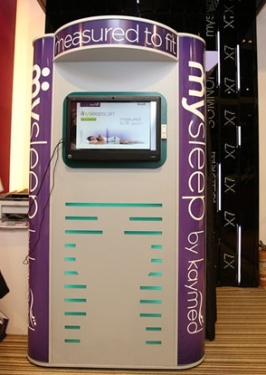 Poor sleep quality is a common problem for many people, especially young people. How to monitor the quality of your sleep? How can you help yourself to have better sleep? In today's high-tech world, you can use the instrument to help yourself. In a recent exhibition, a 360° deep sleep tester attracted people's attention. The tester can quickly analyze your specific sleep data and analyze your weight, body type, sleep habits, sleeping position, etc. to make it more accurate and solve public sleep problems.
Poor sleep quality is a common problem for many people, especially young people. How to monitor the quality of your sleep? How can you help yourself to have better sleep? In today's high-tech world, you can use the instrument to help yourself. In a recent exhibition, a 360° deep sleep tester attracted people's attention. The tester can quickly analyze your specific sleep data and analyze your weight, body type, sleep habits, sleeping position, etc. to make it more accurate and solve public sleep problems. The 360° deep sleep tester has changed the way the traditional instrument lays flat or two-dimensionally. It uses the form of a standing position. Mainly through the camera, cold light sensor to scan the user's spine, and comprehensive analysis of the sleep database to obtain user-specific sleep data. These sleep data can help users better improve sleep quality. For example, an apple-type person may be more suitable for sleep than a more elastic material, which can effectively turn around. If the weight is concentrated in the lower body, you can use a softer, slow rebound material to ensure better blood circulation. This is the data analysis, the reference to improve the quality of sleep.
The current database of 360° deep sleep testers is based on the five dimensions of comfort, degree of support, degree of heat dissipation, air permeability, and health. These data can help people choose the right bed, and they can also help manufacturers to develop materials and mattresses that are most suitable for people's sleep and bring better protection to people's sleep.
A microscope (from the Ancient Greek: μικÏός, mikrós, "small" and σκοπεῖν, skopeîn, "to look" or "see") is an instrument used to see objects that are too small to be seen by the naked eye. Microscopy is the scienceof investigating small objects and structures using such an instrument. Microscopic means invisible to the eye unless aided by a microscope.
There are many types of microscopes, and they may be grouped in different ways. One way is to describe the way the instruments interact with a sample to create images, either by sending a beam of light or electrons to a sample in its optical path, or by scanning across, and a short distance from, the surface of a sample using a probe. The most common microscope (and the first to be invented) is the optical microscope, which uses light to pass through a sample to produce an image. Other major types of microscopes are the fluorescence microscope, the electron microscope (both, the transmission electron microscope and the scanning electron microscope) and the various types of scanning probe microscopes.
Tool Microscope,Video Microscope,Stereo Microscope,Metallographic Microscope
Dongguan Jaten Instrument Co.,LTD(HK TT:Jaten Technology Co.,Ltd ​) , http://www.jatentech.com
![<?echo $_SERVER['SERVER_NAME'];?>](/template/twentyseventeen/skin/images/header.jpg)